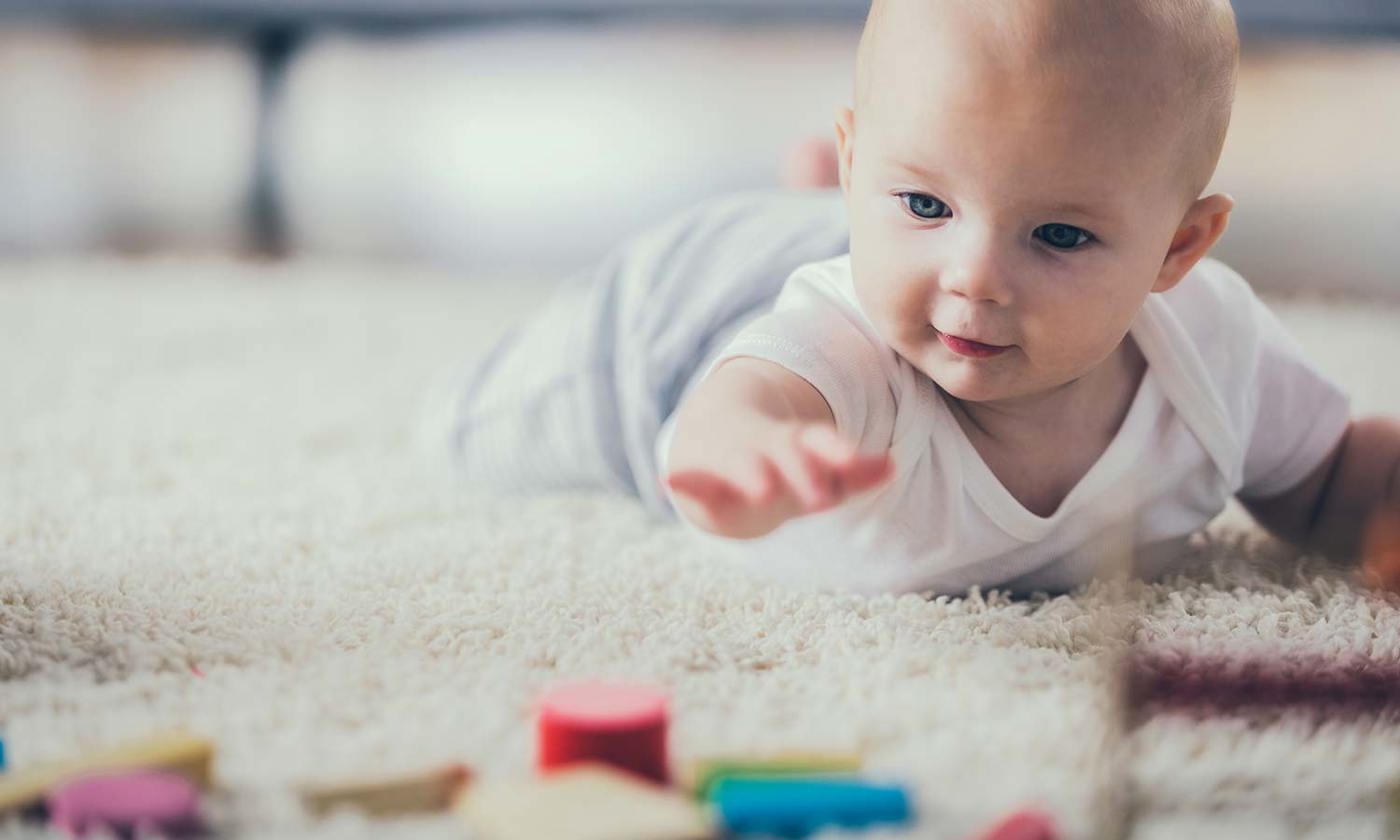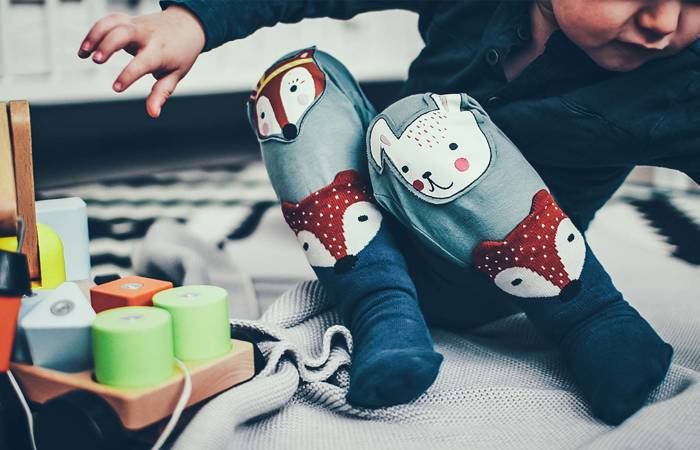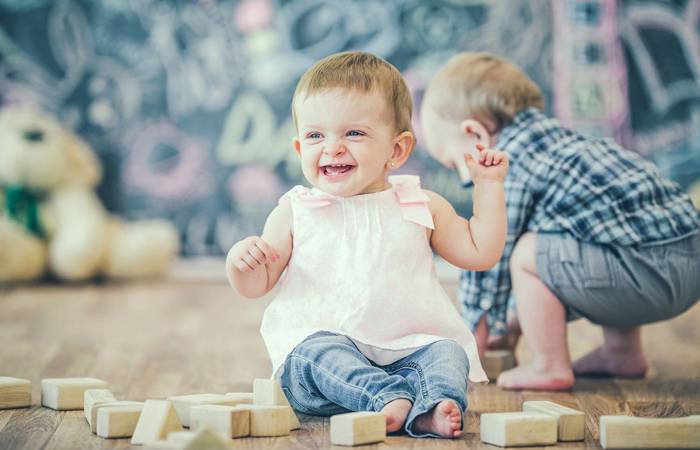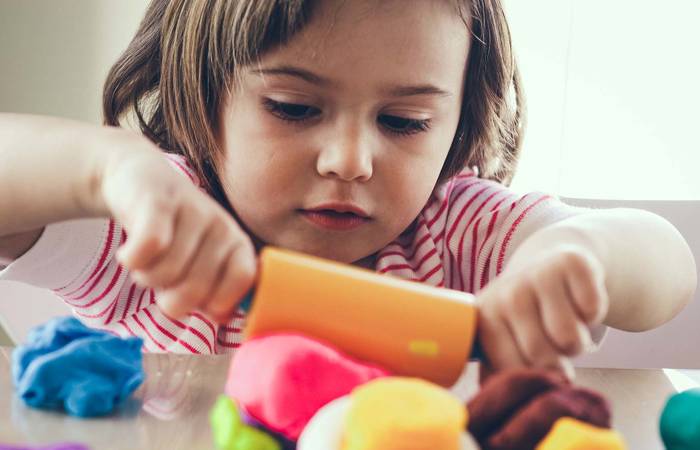Like what you see?
Sign up to receive more free parenting advice.
Thank you for subscribing to our newsletter!
Early Learning

Credit: iStock.com/Steve Debenport
No doubt you’ve already noticed. Your baby is already engaging with the world, ready to learn from every face, noise and voice around them.
From the moment they’re born, our babies are working hard to absorb their new world, getting down to the business of learning and growing.
Naturally inquisitive and geared for play, babies brains are born ready to learn.
In a baby’s first year, their brain will double in size with more than 1,000,000 new neural connections formed every second1.
But nature alone won’t stimulate this spectacular brain development. It’s the combination of genetics and the infant’s experiences that build the foundational structure of their brain, upon which all future learning depends, say the experts.
Through play, children experience, problem solve, communicate and make sense of their world.Professor Ann Farrell
Queensland University of Technology Head of the School of Early Childhood and Inclusive Education, Professor Ann Farrell says play based learning optimises the learning that is happening through play.
“Play based learning is paramount and those (early learning centres) that espouse to have a play based learning approach need to champion play because it is a definite advantage for children,” she says.
“Through play, children experience, problem solve, communicate and make sense of their world.
“We know play is very important to a child’s development. We have compelling evidence of the importance of play to children’s development”.
“Cognitive, physical, social and emotional skills and taking initiative are all skills developed when a child learns by doing, trial and error and experimentation,” she says.
With evidence to support the fact that babies in the womb are communicating and interacting with the world around us, it is no wonder that newborns, toddlers and young children crave opportunities to learn and test new skills, Professor Farrell says.
“Play starts from the moment the child is born (even before) and we do see it in newborns," she says.
“Newborns initiate conversations, they communicate and learn how to exert influence over their caregivers, so we know there is no starting age, it is always happening.
“It is an integral part of human relationships, newborns interact with their caregiver for food or a nappy change. They initiate the exchange and the adult responds.
“Learning through play is not necessarily formal but is part of everyday life and parents should be encouraged to respond to the child,” she says.
“Be mindful that learning through play is set within the cultural contexts and different forms of play may be valued by different cultures. “
Goodstart Early Learning Nursery Educator Danielle Flamia, says babies learn through experience and observation and rely on their senses as they explore their surroundings.
“Beyond their five senses babies also need to develop body awareness and balance, so we spend time on the floor with them - rolling, crawling, climbing and cruising – helping them to move independently and build their sensory systems,” she says.
“Play gives babies a reason to experiment, discover, explore and problem solve. Just like learners of all ages, as long as there is an interesting, engaging and fun question they will strive to find the answer.
“Infants are constantly asking questions to determine who they are and who they will grow up to be.”
Danielle said play based learning with babies is about finding the sweet spot that is both fun and challenging.
“It can be as simple as holding their favourite toy above them and using it to engage their hand eye coordination, crossing their midline and tempting them to roll over onto their side and tummy, all while singing, bopping and being with them in that moment,” she said.
Don’t be afraid to get your hands dirty- when it comes to babies, the messier the better!
Some fun activities to try with your baby
Each of these experiences is allowing the child to grow and learn in ways you may not realise by:
- Using contrasting colours for visual stimulation and development
- Understanding temperatures of cold and hot
- Developing fine motor control and strength
- Watching as two colours blend to make a new one
In each instance we’re helping to build cognitive links in the brain. Small, fun and messy moments, when looked at with an educational lens, have so much meaning and importance in a child's life.
Rainbow pasta: where you cook, cool down and colour pasta with food dye.
Coloured ice cubes: you can use these on paper to create a water colour painting or in a tub of water, letting them try to grip the ice as it slips away and melts.
Water balloons: the ever shape-changing object that rolls, bounces and slips everywhere helps to develop hand-eye coordination and motor skills.
Yoghurt painting: create a colour palate of yoghurt and let them paint, mix, eat and make a mess in the highchair. Easy clean up and nutritional!
Cellophane: listen as it scrunches and crackles, look as the world turns orange, peek-a-boo I see you!
Shredded paper: hunting for toys in the depths of the paper ocean, picking through a thousand paper worms.
Baking: an allergy friendly recipe for banana oat bars is one banana, one cup of oats and a sprinkling of cinnamon. Let them mash, mix, feel, taste and smell it. Mold it into mini bars bake for 12-15 minutes at 180 degree and afternoon tea is done!
Some tips for parents and carers
The key aspect in all of these experiences is you - the parent or carer.
- Vocalise what is happening and ask the questions the baby is ‘asking’, you have to describe what they see, you have to experience the moment with them.
- They’ll watch for your reactions while they are asking “Is it okay that I touch the ice cube?” “Why is it so cold?” “Will it hurt me?” “What do I do with it?” “What is that colourful liquid?”
- They want to learn and grow with you by their side, and they have a right to learn and grow in a loving and caring environment that allows them to find themselves in this world.
1 Center on the Developing Child (2009). Five Numbers to Remember About Early Childhood Development (Brief). Retrieved from www.developingchild.harvard.edu.
Nature Stories
While outside with your child, look for rocks, leaves, or pinecones, and use these objects to retell one of your child’s favourite stories or songs. For example, sing “Old MacDonald” and pretend to use the objects as different animals. Ask your child for ideas.
At this age, your child uses pretend play to practice his/her understanding of symbols—that one thing can stand for another. Being able to make these kinds of connections and to think creatively are important parts of learning how to read and communicate.
See all tips
Get Advice
Real parents. Real problems. We’re here with a group of leading early learning and parenting professionals to answer your questions.






